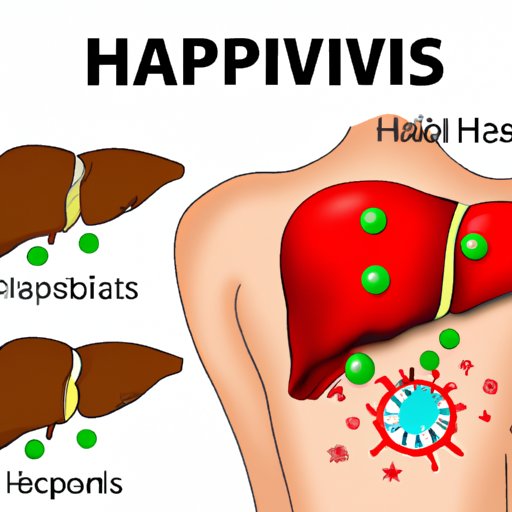
Introduction
If you’ve ever wondered about the symptoms of hepatitis A, you’re not alone. With over 1.5 million cases reported globally each year, hepatitis A is a serious concern, and one that is important to recognize in order to prevent it from spreading. This article will provide a complete guide to the symptoms of hepatitis A, including the telltale signs that may indicate an infection.
A Complete Guide to the Symptoms of Hepatitis A
Hepatitis A is a virus that primarily affects the liver. Symptoms can range from mild to severe and can include fever, fatigue, nausea and vomiting, abdominal pain, loss of appetite, and joint pain. Because symptoms can vary from person to person, it is important to seek medical attention if you are experiencing any of these symptoms.
In most cases, symptoms of hepatitis A will appear within two to six weeks after exposure to the virus. While some people may experience no symptoms at all, others may experience severe symptoms that require immediate medical attention.
10 Telltale Signs You Might Have Hepatitis A
1. Fatigue. Feeling tired or weak can be a common symptom of hepatitis A.
2. Fever. A fever is also a common symptom and may range from mild to severe.
3. Nausea and vomiting. Many people with hepatitis A experience nausea and vomiting.
4. Abdominal pain. Pain in the upper right side of the abdomen is a common symptom of hepatitis A.
5. Loss of appetite. Many people with hepatitis A lose their appetite and may experience weight loss.
6. Joint pain. Joint pain or stiffness can be a symptom of hepatitis A.
7. Dark urine. Dark urine is a sign that your liver function may be impaired.
8. Grey-colored stool. Stools may become pale or grey-colored due to the liver being unable to produce bile.
9. Itching. Itching can be caused by bile salts building up in the skin due to liver dysfunction.
10. Jaundice. Jaundice is a yellowing of the skin and eyes that can occur due to an accumulation of bilirubin in the body.
If you are experiencing any of these symptoms, it is important to seek medical attention immediately.
Understanding the Common Symptoms of Hepatitis A
Hepatitis A is transmitted through contaminated food or water, and is most commonly spread in areas with poor sanitation and hygiene. It can also be spread through close personal contact with an infected person, such as through sexual activity or sharing needles.
Individuals who are at a higher risk of contracting hepatitis A include those who travel to areas with poor sanitation and hygiene, have close contact with an infected person, are men who have sex with men, or use injection drugs.
The best way to prevent the spread of hepatitis A is by getting vaccinated. In addition, practicing good hygiene, avoiding risky behaviors, and using sanitation measures such as washing hands before and after using the restroom can help prevent the spread of the virus.
Hepatitis A: Recognizing the Warning Signs
In some cases, the symptoms of hepatitis A can become more severe and may require immediate medical attention. These symptoms may include:
– Severe abdominal pain
– Persistent vomiting
– High fever
– Yellowing of the skin and eyes (jaundice)
– Stools that are light or clay-colored
– Unexplained fatigue or weakness
If you experience any of these symptoms, it is important to seek medical attention as soon as possible. Left untreated, hepatitis A can progress to more serious health complications.
What You Need to Know About Hepatitis A Symptoms
In summary, recognizing the symptoms of hepatitis A is critical in preventing the spread of the virus. Symptoms can range from mild to severe and may include fatigue, fever, nausea and vomiting, abdominal pain, and joint pain. It is important to seek medical attention if you experience any of these symptoms, as well as more severe symptoms like jaundice or persistent abdominal pain. By practicing good hygiene and seeking vaccination, you can help prevent the spread of hepatitis A and keep yourself and those around you healthy.
Conclusion
In conclusion, hepatitis A is a serious concern that affects millions of people globally each year. By understanding the symptoms of hepatitis A and taking preventative measures, we can help prevent the spread of the virus and protect ourselves and our communities. Remember, if you experience any symptoms of hepatitis A, seek medical attention immediately. Together, we can work to stop the spread of hepatitis A and create a healthier world.




